[ad_1]
OpenAI’s ChatGPT has proven to be a game-changing tool for SEO professionals. As Google has indicated an increased willingness to allow AI-generated content to rank and OpenAI has released new versions of GPT for enterprise use, the use cases have only expanded exponentially.
In January 2024, another monumental shift occurred when OpenAI declared the GPT store open for business. ChatGPT Plus users and those with access to Team and Enterprise plans can explore custom GPTs developed by almost anyone.
Mirroring the strategy used by Apple and Google’s mobile app stores, the platform provided by OpenAI is meant to empower users to build upon their existing product with custom features and experiences for specific use cases. Ultimately, OpenAI plans to introduce a payment model based on user engagement for app developers and creators.
This article delves into how SEO experts use ChatGPT and provides insights into the most popular custom GPTS available now and how they’re being integrated into overall SEO strategies.
How are SEO professionals using ChatGPT?
In the three-month window between when OpenAI introduced the ability to create custom GPTs and the launch of the official GPT store, more than 3 million custom versions of ChatGPT were created by users.
SEOs are leveraging this AI technology for various tasks, including content creation, keyword research, and technical optimizations.
ChatGPT’s ability to understand and generate human-like text makes it a powerful tool to use in all phases of the content creation process. At the same time, its natural language processing (NLP) capabilities can assist in keyword discovery and strategy formulation.
What are ChatGPT plugins?
ChatGPT plugins, or “GPTs,” are “custom versions of ChatGPT that combine instructions, extra knowledge, and any combination of skills,” according to OpenAI.
While OpenAI’s app store model is similar to that of Apple or Google, the barrier to entry is lower. Anyone can build their own GPT without any coding required, and they can be for personal or internal company use or released to the public.
Opening a custom GPT will look similar to current ChatGPT users, as they are built off the same text interface and involve the same back-and-forth conversational experience of the traditional model.
Building off the platform’s capabilities, GPT developers can also define custom actions by making APIs available to the GPT. This means GPTs can access external data, making them even more powerful tools for “real-world” research and integration.
To list a GPT in the GPT store, the creator must verify their builder profile by making their name visible or linking to a website.
Dig deeper: How ChatGPT plugins can up your SEO game
How to enable custom GPTs
As of writing, OpenAI’s GPT Store is accessible to:
- Users who have a ChatGPT Plus subscription, priced at $20/month.
- Users on the business-oriented plans, ChatGPT Team and Enterprise, with pricing ranging from $25 to several thousand dollars per user per month.
Once logged in, users can access the GPT store and browse leaderboards and popular apps across categories like writing, productivity, DALL-E image generation and more.
Downloading a custom GPT is simple: simply click on the one you desire and it will open in a new window.
Just like the traditional GPT experience, previous conversations will be remembered and can be returned across sessions. Clicking the app-specific logo will launch a new conversation with the custom GPT.
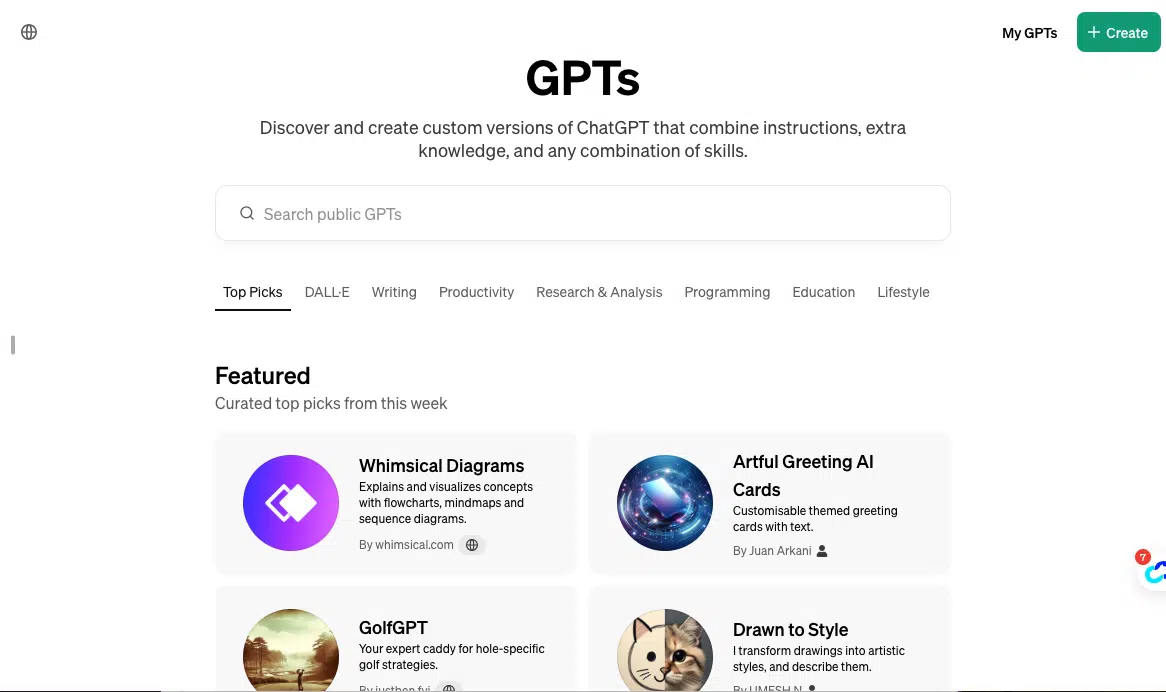

Get the daily newsletter search marketers rely on.
Custom GPTs for SEO
Here are some of the most popular and useful custom GPTs developed for SEO professionals, along with descriptions and examples of what they can do.
Note that the list of GPTs available is constantly updating as new developers sign on and OpenAI rolls out new features regularly.
1. Automated Writer by OctaneAI
Crafts well-written, optimized and researched content in your unique voice. Input your content topic, target keywords, tone of voice, past content examples and goal of your piece, and this GPT will output your desired copy, sourced by research with Bing.
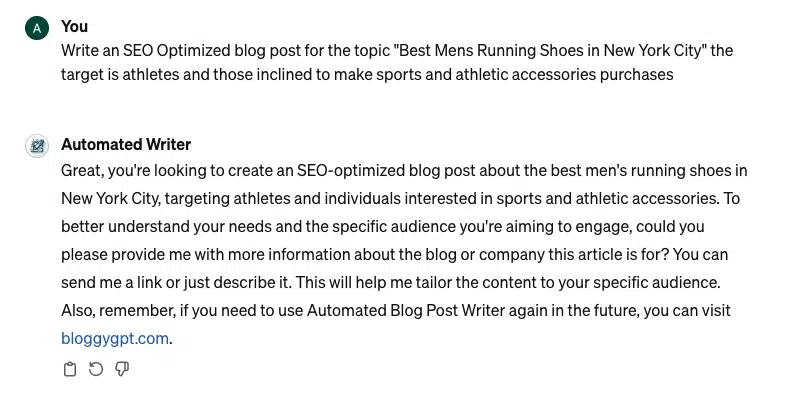

2. Bramework SEO Booster by Bramework
An SEO-focused blogging assistant offering insights into keywords, search volume, rankings, and SERP features. It can enhance SEO strategies with related keyword analysis and can turn YouTube videos into blog and social media posts.


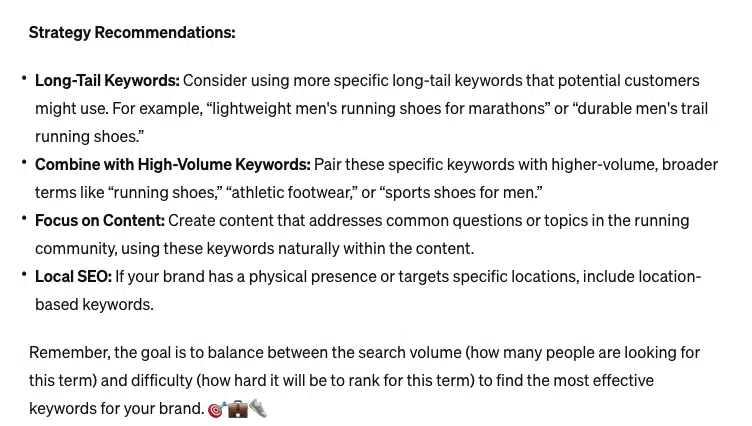

3. SEO by Elevate
Enter any URL, and this GPT will generate a full on-page SEO analysis with insights to optimize headings and content for any keyword. It reviews the loading time, identifies broken links, conducts image analysis and checks whether your website is mobile-friendly and has a valid SSL certificate.
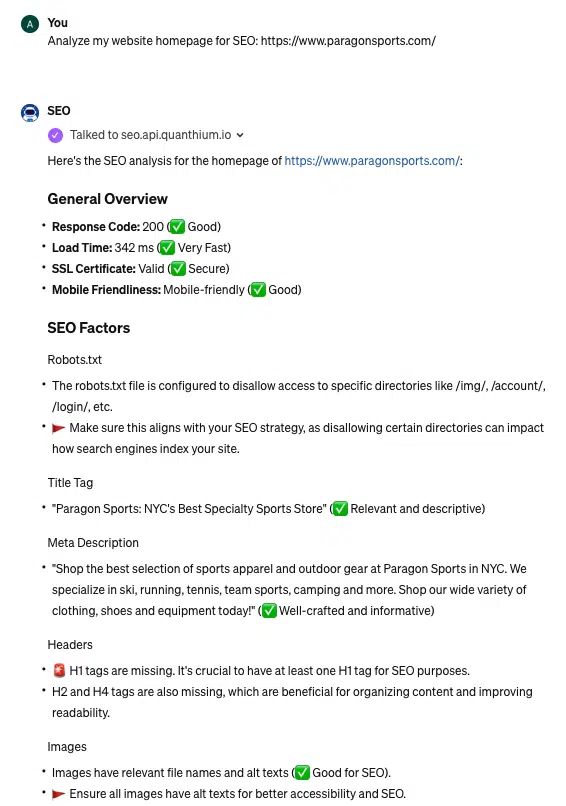

4. Outrank Article by aiseo.ai
Beat your competitors at their own game. Enter the URL of the article you wish to outrank and receive back an in-depth SEO analysis designed to rank higher.
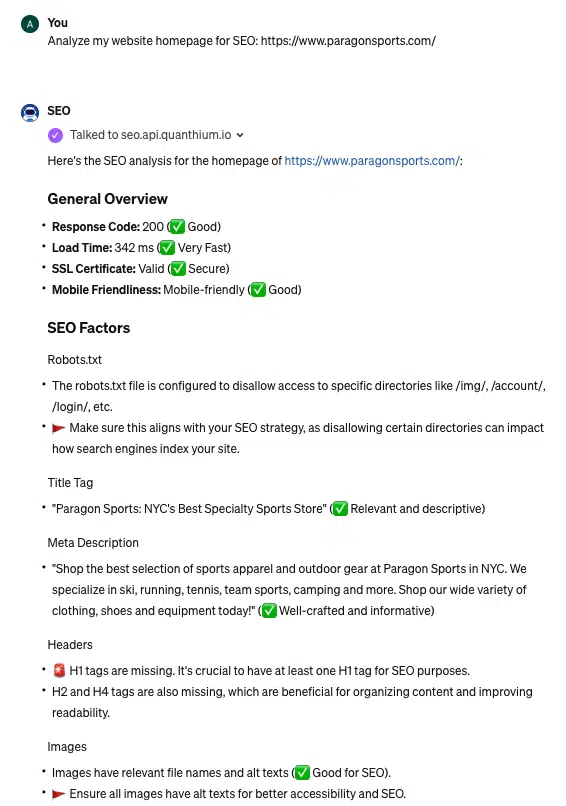

5. FAQ Schema Markup Generator by Brian Wylie
Structured data markup is key to ranking pages within Google SERP features and SGE responses.
With this GPT, you can generate schema FAQs for webpages by pasting a single URL. It provides FAQs in a simple list, HTML or FAQ Schema Markup.org format for articles, blog posts and product pages.
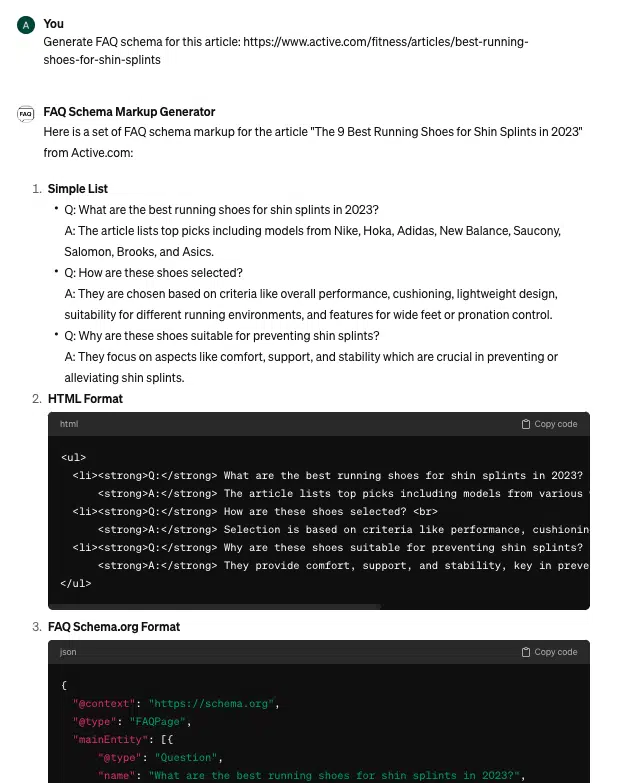

6. Website Analyzer by ARTURS MEDNIS
This is a great tool for starting work on a new domain. You can receive analysis and explanation of a website’s performance, SEO, and UX metrics, focusing on Web Vitals.
This GPT will provide links to the best tools for specific analyses and help you understand the significance of results when inputted.
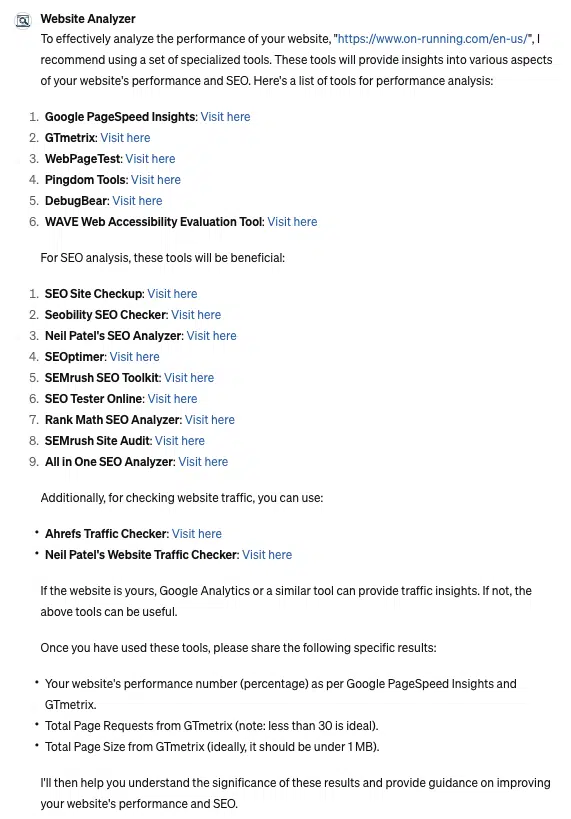

7. Scraper by hqdata.com
This scraper can help you efficiently perform complex web scraping tasks with the capability of scraping dynamic content.
Extracting this data helps you track the page ranks of competitors and understand their content strategy better.
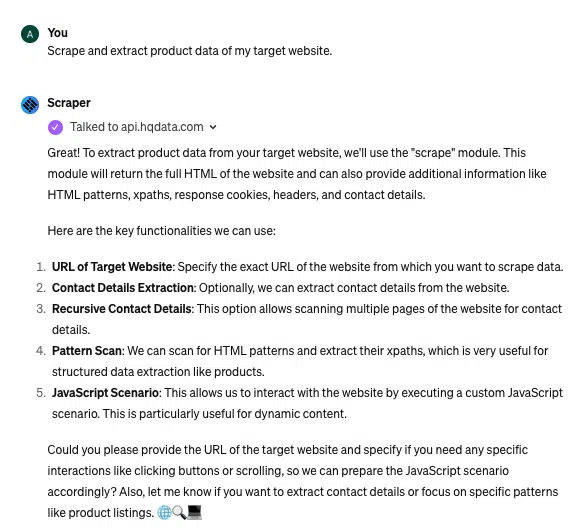

8. Backlink Auditor by intelliminds.ai
Expert in backlink audit, analyzing and optimizing SEO backlink strategies for enhanced profile quality and actionable insights.
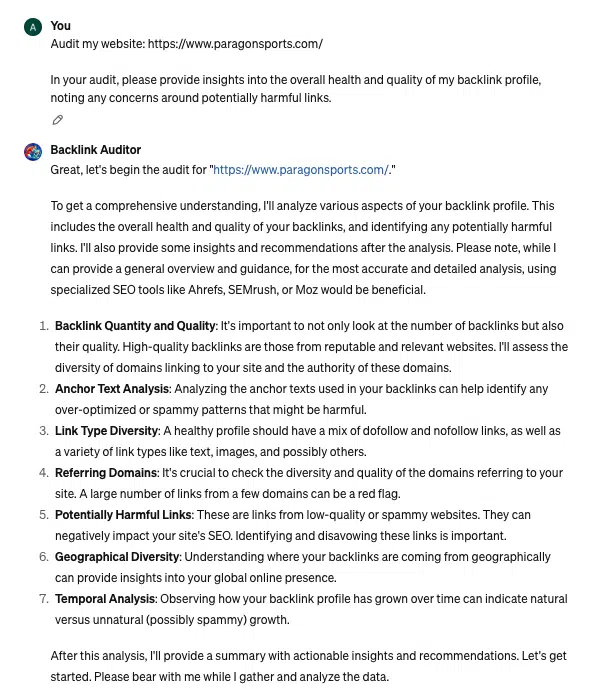

9. SEOmator Free Keyword Research & SERP Analyzer GPT by seomator.com
This comprehensive GPT scrapes Google for real-time search volume data, identifies optimal keywords for SEO, analyzes search engine results page rankings, and evaluates on-page SEO metrics.
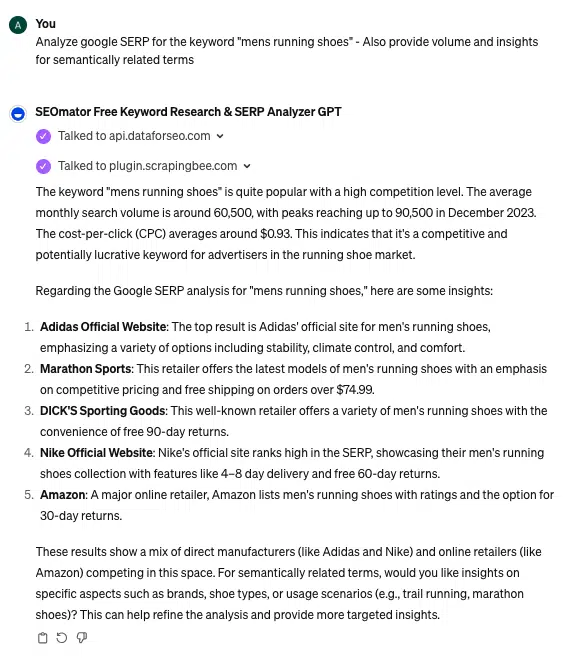

Enhancing your SEO strategy with custom GPTs and the GPT Store
Integrating ChatGPT plugins and other AI tools for SEO tasks has already begun to reshape the landscape, offering unprecedented efficiency and deeper insights.
This holds especially true for competitor research and the ability to understand how your crucial competition is evolving its SEO strategy.
As a general best practice, always remember that when it comes to GPTs, the quality of your output depends on the quality of your input. Experimenting and perfecting your prompts is vital to maximizing any of these custom GPTs.
Dig deeper: 5 SEO use cases for ChatGPT’s Advanced Data Analysis plugin
Opinions expressed in this article are those of the guest author and not necessarily Search Engine Land. Staff authors are listed here.
[ad_2]





